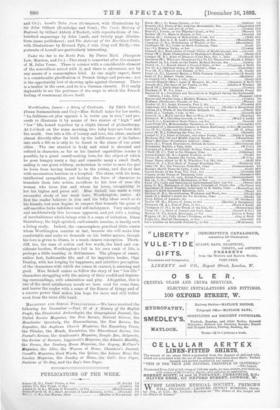Worthington, Junior : a Story of Contrasts. By Edith Sichel.
(Swan Sonnenschein and Co.)—Miss Sichell takes for her motto, "La faiblesse eat plus opposee a In vertu que is vice," and pro- ceeds to illustrate it by means of two stories of "high" and "low" life, bound together by a slight thread of philanthropy. At 2 o'clock on the same morning, two baby boys are born iht0 the world. One into a life of luxury and love, the other, maimed almost directly after its birth by the indifference of its father, into such a life as is only to be found in the slums of our great cities. The one stunted in body and mind is elevated and refined in character, as far as his limited capabilities render it possible, by a great unself-seeking love, for the object of which he goes hungry many a day, and commits many a small theft, ending in one great robbery, undertaken in order to save the girl he loves from having herself to be the robber, and dies at last with unconscious heroism in a hospital. The other, with his keen, intellectual sympathies, yet lacking the force of character to translate them into action, sacrifices to his love of ease the woman who loves him and whom he loves, recognising in her his higher and purer self. Miss Sichell has made s very successful study of her weak hero, Worthington, junior. At first the reader believes in him and his lofty ideas much as do his friends, but soon begins to suspect that beneath the guise of self-sacrifice lurks indolence and self-indulgence. Very naturally and unobtrusively this becomes apparent, and yet with a feeling of inevitableness which brings with it a sense of irritation. Diana Saintsbury, the high-spirited, enthusiastic heroine, is hardly such a living study. Indeed, the commonplace, practical little cousin whom Worthington marries at last, because she will make him comfortable and make no demands on his better nature, though his love is given to Diana, is a much clearer conception. Thorn- cliff, too, the man of action and few words, the kind and con- siderate brother, Worthington's foil in his own rank of life, is perhaps a little wanting in distinctness. The glimpse of smart, rather fast, fashionable life, and of its impulsive leader, Olga Dunlop, with her longing for happiness, and intuitive perception of the characters with whicb she comes in contact, is amusing and good. Miss Sichell makes us follow the story of her " low-life " characters struggling with the misery of their sordid and depress- ing surroundings, with admiration and pity. Altogether, this is one of the most satisfactory novels we have read for some time, and leaves the reader with a sense of the fitness of things and of a reserve power that makes him hope for more and still better work from the same able hand,










































 Previous page
Previous page